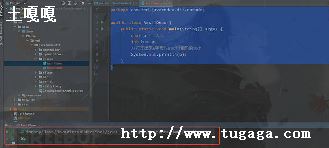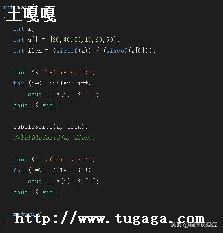

你是用rsa算法去加密,还是要自己编写一个rsa算法?
RSA是非对称加密算法,可以用它通过KeyPairGenerator来生成KeyPari,它里面有公钥和私钥.
代码如下:main方法用于测试的,不是算法本身.
import java.security.KeyPair;
import java.security.KeyPairGenerator;
import java.security.PrivateKey;

import java.security.PublicKey;
import java.security.SecureRandom;
import javax.crypto.Cipher;
public class RSACrypto
{

private final static String RSA = "RSA";
public static PublicKey uk;
public static PrivateKey rk;
public static void generateKey() throws Exception
KeyPairGenerator gen = KeyPairGenerator.getInstance(RSA);
KeyPair keyPair = gen.generateKeyPair();
uk = keyPair.getPublic();
rk = keyPair.getPrivate();
}
private static byte[] encrypt(String text, PublicKey pubRSA) throws Exception
Cipher cipher = Cipher.getInstance(RSA);
cipher.init(Cipher.ENCRYPT_MODE, pubRSA);
return cipher.doFinal(text.getBytes());
public final static String encrypt(String text)
try {
catch(Exception e)
e.printStackTrace();
return null;
public final static String decrypt(String data)
try{
catch (Exception e)
private static byte[] decrypt(byte[] src) throws Exception
cipher.init(Cipher.DECRYPT_MODE, rk);
return cipher.doFinal(src);
String hs = "";
String stmp = "";
for (int n = 0; n b.length; n ++)
stmp = Integer.toHexString(b[n] 0xFF);
if (stmp.length() == 1)
hs += ("0" + stmp);
else
hs += stmp;
return hs.toUpperCase();
throw new IllegalArgumentException("长度不是偶数");
//just for test
public static void main(String args[])
try
RSACrypto.generateKey();
String cipherText = RSACrypto.encrypt("asdfghjh");
System.out.println(cipherText);
String plainText = RSACrypto.decrypt(cipherText);
System.out.println(plainText);
import?javax.crypto.Cipher;
import?java.io.FileInputStream;

import?java.io.FileOutputStream;
import?java.io.ObjectInputStream;
import?java.io.ObjectOutputStream;
import?java.security.Key;
import?java.security.KeyPair;
import?java.security.KeyPairGenerator;
import?java.security.SecureRandom;
public?class?RSA_Encrypt?{
/**?指定加密算法为DESede?*/
private?static?String?ALGORITHM?=?"RSA";
/**?指定key的大小?*/
/**?指定公钥存放文件?*/
private?static?String?PUBLIC_KEY_FILE?=?"PublicKey";
/**?指定私钥存放文件?*/
private?static?String?PRIVATE_KEY_FILE?=?"PrivateKey";
//?private?static?String?PUBLIC_KEY_FILE?=?"D://PublicKey.a";
//?private?static?String?PRIVATE_KEY_FILE?=?"D://PrivateKey.a";
/**
*?生成密钥对
*/
private?static?void?generateKeyPair()?throws?Exception{
/**?RSA算法要求有一个可信任的随机数源?*/
SecureRandom?sr?=?new?SecureRandom();
/**?为RSA算法创建一个KeyPairGenerator对象?*/
KeyPairGenerator?kpg?=?KeyPairGenerator.getInstance(ALGORITHM);
/**?利用上面的随机数据源初始化这个KeyPairGenerator对象?*/
kpg.initialize(KEYSIZE,?sr);
/**?生成密匙对?*/
KeyPair?kp?=?kpg.generateKeyPair();
/**?得到公钥?*/
Key?publicKey?=?kp.getPublic();
/**?得到私钥?*/
Key?privateKey?=?kp.getPrivate();
/**?用对象流将生成的密钥写入文件?*/
ObjectOutputStream?oos1?=?new?ObjectOutputStream(new?FileOutputStream(PUBLIC_KEY_FILE));
oos1.writeObject(publicKey);
/**?清空缓存,关闭文件输出流?*/
oos1.close();
*?加密方法
*?source:?源数据
public?static?String?encrypt(String?source)?throws?Exception{
generateKeyPair();
/**?将文件中的公钥对象读出?*/
ObjectInputStream?ois?=?new?ObjectInputStream(new?FileInputStream(PUBLIC_KEY_FILE));
Key?key?=?(Key)?ois.readObject();
ois.close();
/**?得到Cipher对象来实现对源数据的RSA加密?*/
Cipher?cipher?=?Cipher.getInstance(ALGORITHM);
cipher.init(Cipher.ENCRYPT_MODE,?key);
byte[]?b?=?source.getBytes();
/**?执行加密操作?*/
byte[]?b1?=?cipher.doFinal(b);
return?encoder.encode(b1);
*?解密算法
*?cryptograph:密文
public?static?String?decrypt(String?cryptograph)?throws?Exception{
/**?将文件中的私钥对象读出?*/
ObjectInputStream?ois?=?new?ObjectInputStream(new?FileInputStream(PRIVATE_KEY_FILE));
/**?得到Cipher对象对已用公钥加密的数据进行RSA解密?*/
cipher.init(Cipher.DECRYPT_MODE,?key);
byte[]?b1?=?decoder.decodeBuffer(cryptograph);
/**?执行解密操作?*/
byte[]?b?=?cipher.doFinal(b1);
return?new?String(b);
public?static?void?main(String[]?args)?{
try?{
String?source?=?"Hello?World!";//要加密的字符串
String?cryptograph?=?encrypt(source);
System.out.println(cryptograph);
String?target?=?decrypt(cryptograph);//解密密文
System.out.println(target);
}?catch?(Exception?e)?{
//?TODO?Auto-generated?catch?block
}//生成的密文
RSA算法非常简单,概述如下:
找两素数p和q
取n=p*q
取t=(p-1)*(q-1)
取任何一个数e,要求满足et并且e与t互素(就是最大公因数为1)
取d*e%t==1
这样最终得到三个数: n d e
设消息为数M (M n)
设c=(M**d)%n就得到了加密后的消息c
设m=(c**e)%n则 m == M,从而完成对c的解密.
注:**表示次方,上面两式中的d和e可以互换.
在对称加密中:
n d两个数构成公钥,可以告诉别人;
n e两个数构成私钥,e自己保留,不让任何人知道.
给别人发送的信息使用e加密,只要别人能用d解开就证明信息是由你发送的,构成了签名机制.
别人给你发送信息时使用d加密,这样只有拥有e的你能够对其解密.
rsa的安全性在于对于一个大数n,没有有效的方法能够将其分解
从而在已知n d的情况下无法获得e;同样在已知n e的情况下无法
求得d.
二实践
此时此刻呢我们来一个实践,看看实际的操作:
找两个素数:
这样
用perl简单穷举可以获得满主 e*d%t ==1的数d:
最终我们获得关键的
加密:
用perl的大数计算来算一下:
解密:
我们可以用e来对加密后的c进行解密,还原M:
三字符串加密
把上面的过程集成一下我们就能实现一个对字符串加密解密的示例了.
代码如下:
#!/usr/bin/perl -w
#RSA 计算过程学习程序编写的测试程序
#
use strict;
use Math::BigInt;
my $N=new Math::BigInt($RSA_CORE{n});
my $E=new Math::BigInt($RSA_CORE{e});
my $D=new Math::BigInt($RSA_CORE{d});
print "N=$N D=$D E=$E\n";
sub RSA_ENCRYPT
my $r_mess = shift @_;
my ($c,$i,$M,$C,$cmess);
for($i=0;$i length($$r_mess);$i++)
$c=ord(substr($$r_mess,$i,1));
$M=Math::BigInt-new($c);
$C=$M-copy(); $C-bmodpow($D,$N);
$cmess.=$c;
return \$cmess;
sub RSA_DECRYPT
my ($c,$i,$M,$C,$dmess);
$c=hex($c);
$C=$M-copy(); $C-bmodpow($E,$N);
$c=chr($C);
$dmess.=$c;
return \$dmess;
my $mess="RSA 娃哈哈哈~~~";
$mess=$ARGV[0] if @ARGV = 1;
print "原始串:",$mess,"\n";
my $r_cmess = RSA_ENCRYPT(\$mess);
print "加密串:",$$r_cmess,"\n";
my $r_dmess = RSA_DECRYPT($r_cmess);
print "解密串:",$$r_dmess,"\n";
#EOF
测试一下:
C:\Tempperl rsa-test.pl
原始串:RSA 娃哈哈哈~~~
解密串:RSA 娃哈哈哈~~~
C:\Tempperl rsa-test.pl 安全焦点(xfocus)
原始串:安全焦点(xfocus)
解密串:安全焦点(xfocus)
四提高
我们可以通过RSAKit、RSATool之类的工具获得足够大的N 及D E.
d=0x10001
设原始信息
完成这么大数字的计算依赖于大数运算库,用perl来运算非常简单:
A) 用d对M进行加密如下:
c=M**d%n :
即用d对M加密后信息为:
B) 用e对c进行解密如下:
m=c**e%n :
C) RSA通常的实现
RSA简洁幽雅,但计算速度比较慢,通常加密中并不是直接使用RSA 来对所有的信息进行加密,
最常见的情况是随机产生一个对称加密的密钥,然后使用对称加密算法对信息加密,之后用
RSA对刚才的加密密钥进行加密.
----------------------------------------------------------
一个简单的RSA算法实现JAVA源代码:
filename:RSA.java
/*
*
* TODO To change the template for this generated file go to
* Window - Preferences - Java - Code Style - Code Templates
import java.math.BigInteger;
import java.io.InputStream;
import java.io.OutputStream;
import java.io.FileInputStream;
import java.io.FileOutputStream;
import java.io.FileNotFoundException;
import java.io.IOException;
import java.io.FileWriter;
import java.io.FileReader;
import java.io.BufferedReader;
import java.util.StringTokenizer;
* @author Steve
* TODO To change the template for this generated type comment go to
public class RSA {
* BigInteger.ZERO
private static final BigInteger ZERO = BigInteger.ZERO;
* BigInteger.ONE
private static final BigInteger ONE = BigInteger.ONE;
* Pseudo BigInteger.TWO
private BigInteger myKey;
private BigInteger myMod;
private int blockSize;
public RSA (BigInteger key, BigInteger n, int b) {
myKey = key;
myMod = n;
blockSize = b;
public void encodeFile (String filename) {
byte[] temp;
int tempLen;
InputStream is = null;
FileWriter writer = null;
is = new FileInputStream(filename);
writer = new FileWriter(filename + ".enc");
catch (FileNotFoundException e1){
System.out.println("File not found: " + filename);
catch (IOException e1){
System.out.println("File not found: " + filename + ".enc");
* Write encoded message to 'filename'.enc
for (int i = tempLen + 1; i bytes.length; ++i) {
bytes[i] = 0;
writer.write(encodeDecode(new BigInteger(bytes)) + " ");
catch (IOException e1) {
System.out.println("error writing to file");
* Close input stream and file writer
is.close();
writer.close();
System.out.println("Error closing file.");
public void decodeFile (String filename) {
FileReader reader = null;
OutputStream os = null;
reader = new FileReader(filename);
os = new FileOutputStream(filename.replaceAll(".enc", ".dec"));
catch (FileNotFoundException e1) {
if (reader == null)
System.out.println("File not found: " + filename.replaceAll(".enc", "dec"));
BufferedReader br = new BufferedReader(reader);
int offset;
byte[] temp, toFile;
StringTokenizer st = null;
while (br.ready()) {
st = new StringTokenizer(br.readLine());
while (st.hasMoreTokens()){
toFile = encodeDecode(new BigInteger(st.nextToken())).toByteArray();
offset = temp.length - toFile.length;
for (int i = toFile.length - 1; (i = 0) ((i + offset) = 0); --i) {
temp[i + offset] = toFile[i];
toFile = temp;
System.out.println(toFile.length + " x " + temp.length);
for (int i = 1; i temp.length; i++) {
temp[i] = toFile[i - 1];
os.write(toFile);
System.out.println("Something went wrong");
* close data streams
os.close();
reader.close();
* Performs ttbase/tt^supttpow/tt/sup within the modular
* domain of ttmod/tt.
* @param base the base to be raised
* @param pow the power to which the base will be raisded
* @param mod the modular domain over which to perform this operation
* @return ttbase/tt^supttpow/tt/sup within the modular
public BigInteger encodeDecode(BigInteger base) {
BigInteger a = ONE;
BigInteger s = base;
BigInteger n = myKey;
while (!n.equals(ZERO)) {
if(!n.mod(TWO).equals(ZERO))
a = a.multiply(s).mod(myMod);
return a;
① 来自于 的RSA算法实现源代码包:
- 源代码包
- 编译好的jar包
另外关于RSA算法的php实现请参见文章:
php下的RSA算法实现
RSA加密的JavaScript实现:
import java.security.*;
import java.security.spec.RSAPublicKeySpec;
import java.security.spec.RSAPrivateKeySpec;
import java.security.spec.InvalidKeySpecException;
import java.security.interfaces.RSAPrivateKey;
import java.security.interfaces.RSAPublicKey;
import java.io.*;
* RSA 工具类.提供加密,解密,生成密钥对等方法.
* @author xiaoyusong
public class RSAUtil {
* 生成密钥对
* @return KeyPair
* @throws EncryptException
public static KeyPair generateKeyPair() throws EncryptException {
KeyPairGenerator keyPairGen = KeyPairGenerator.getInstance("RSA",
new org.bouncycastle.jce.provider.BouncyCastleProvider());
keyPairGen.initialize(KEY_SIZE, new SecureRandom());
KeyPair keyPair = keyPairGen.genKeyPair();
return keyPair;
} catch (Exception e) {
throw new EncryptException(e.getMessage());
* 生成公钥
* @param modulus
* @param publicExponent
* @return RSAPublicKey
public static RSAPublicKey generateRSAPublicKey(byte[] modulus, byte[] publicExponent) throws EncryptException {
KeyFactory keyFac = null;
keyFac = KeyFactory.getInstance("RSA", new org.bouncycastle.jce.provider.BouncyCastleProvider());
} catch (NoSuchAlgorithmException ex) {
throw new EncryptException(ex.getMessage());
RSAPublicKeySpec pubKeySpec = new RSAPublicKeySpec(new BigInteger(modulus), new BigInteger(publicExponent));
return (RSAPublicKey) keyFac.generatePublic(pubKeySpec);
} catch (InvalidKeySpecException ex) {
* 生成私钥
* @param privateExponent
* @return RSAPrivateKey
public static RSAPrivateKey generateRSAPrivateKey(byte[] modulus, byte[] privateExponent) throws EncryptException {
RSAPrivateKeySpec priKeySpec = new RSAPrivateKeySpec(new BigInteger(modulus), new BigInteger(privateExponent));
return (RSAPrivateKey) keyFac.generatePrivate(priKeySpec);
* 加密
* @param key 加密的密钥
* @param data 待加密的明文数据
* @return 加密后的数据
public static byte[] encrypt(Key key, byte[] data) throws EncryptException {
Cipher cipher = Cipher.getInstance("RSA", new org.bouncycastle.jce.provider.BouncyCastleProvider());
cipher.init(Cipher.ENCRYPT_MODE, key);
int outputSize = cipher.getOutputSize(data.length);//获得加密块加密后块大小
int leavedSize = data.length % blockSize;
int blocksSize = leavedSize != 0 ? data.length / blockSize + 1 : data.length / blockSize;
byte[] raw = new byte[outputSize * blocksSize];
int i = 0;
while (data.length - i * blockSize 0) {
if (data.length - i * blockSize blockSize)
cipher.doFinal(data, i * blockSize, blockSize, raw, i * outputSize);
cipher.doFinal(data, i * blockSize, data.length - i * blockSize, raw, i * outputSize);
//这里面doUpdate方法不可用,查看源代码后发现每次doUpdate后并没有什么实际动作除了把byte[]放到ByteArrayOutputStream中,而最后doFinal的时候才将所有的byte[]进行加密,可是到了此时加密块大小很可能已经超出了OutputSize所以只好用dofinal方法.
i++;
return raw;
* 解密
* @param key 解密的密钥
* @param raw 已经加密的数据
* @return 解密后的明文
public static byte[] decrypt(Key key, byte[] raw) throws EncryptException {
cipher.init(cipher.DECRYPT_MODE, key);
int blockSize = cipher.getBlockSize();
int j = 0;
while (raw.length - j * blockSize 0) {
bout.write(cipher.doFinal(raw, j * blockSize, blockSize));
j++;
return bout.toByteArray();
* @param args
* @throws Exception
public static void main(String[] args) throws Exception {
File file = new File("test.html");
FileInputStream in = new FileInputStream(file);
ByteArrayOutputStream bout = new ByteArrayOutputStream();
int count = 0;
while ((count = in.read(tmpbuf)) != -1) {
bout.write(tmpbuf, 0, count);
in.close();
byte[] orgData = bout.toByteArray();
KeyPair keyPair = RSAUtil.generateKeyPair();
RSAPublicKey pubKey = (RSAPublicKey) keyPair.getPublic();
RSAPrivateKey priKey = (RSAPrivateKey) keyPair.getPrivate();
byte[] pubModBytes = pubKey.getModulus().toByteArray();
byte[] pubPubExpBytes = pubKey.getPublicExponent().toByteArray();
byte[] priModBytes = priKey.getModulus().toByteArray();
byte[] priPriExpBytes = priKey.getPrivateExponent().toByteArray();
RSAPublicKey recoveryPubKey = RSAUtil.generateRSAPublicKey(pubModBytes,pubPubExpBytes);
RSAPrivateKey recoveryPriKey = RSAUtil.generateRSAPrivateKey(priModBytes,priPriExpBytes);
byte[] raw = RSAUtil.encrypt(priKey, orgData);
file = new File("encrypt_result.dat");
OutputStream out = new FileOutputStream(file);
out.write(raw);
out.close();
byte[] data = RSAUtil.decrypt(recoveryPubKey, raw);
file = new File("decrypt_result.html");
out = new FileOutputStream(file);
out.write(data);
out.flush();
这个行吧
再参考这个吧
以上就是土嘎嘎小编为大家整理的rsa算法代码java相关主题介绍,如果您觉得小编更新的文章只要能对粉丝们有用,就是我们最大的鼓励和动力,不要忘记讲本站分享给您身边的朋友哦!!